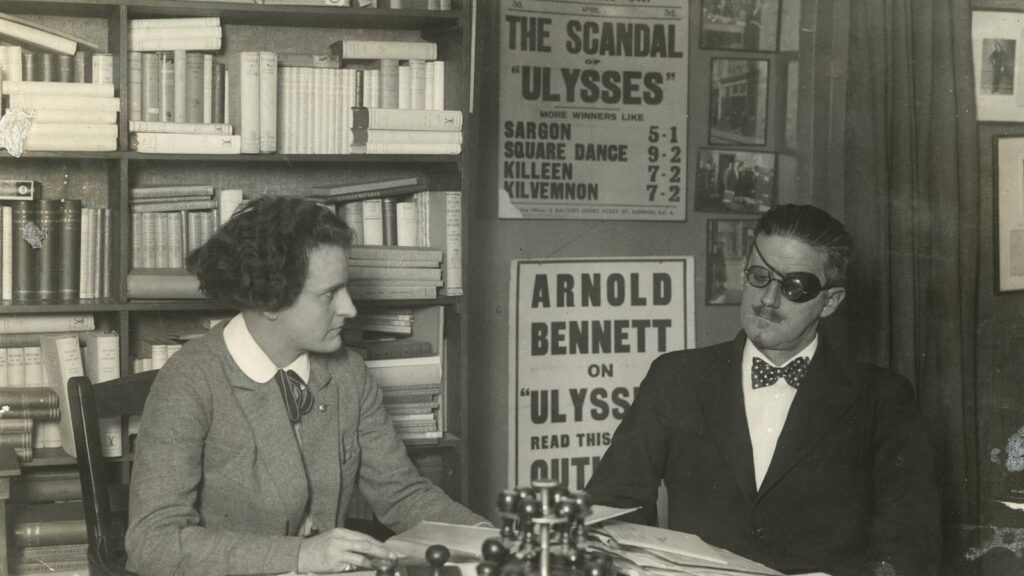Bloomsday reports
We had our Bloomsday lunch in Cambridge on Thursday — burgundy and gorgonzola sandwiches and numerous readings from the great book. But, in sartorial terms, I’m afraid that our little gathering wasn’t a patch on this assembly of Delhi Joyceans, of which Simon Roberts volunteered this splendid photograph.

JJ — himself a natty dresser when in funds (see picture below of him with Harriet Weaver) would have admired the chap in the splendid blue suit.

(from the Harry Ransom Center at the University of Texas at Austin.)
Quote of the Day
”Olga Khmil, one of Molfar’s intelligence analysts, says Russia is now using group channels in messaging apps like Telegram to aim its artillery better. Russians pretending to be Ukrainians on these channels feign fear of shelling in order to elicit information about infrastructure that has and has not been hit. On May 24th the sbu revealed an even more devious approach to such espionage. The agency said it had discovered that Russian intelligence was using smartphone games to induce unwitting youngsters to snap and upload geotagged photos of critical infrastructure, military and civilian. In exchange, players receive virtual prizes of no value outside the video-game world. And Russia gets to wreck their country.”
- from an Economist report on the artillery battle in Donbas.
Musical alternative to the morning’s radio news
Eels | Grace Kelly Blues
Came to mind yesterday when “Grace Kelly” happened to be the answer to a crossword clue: “Devious clergy leak real name of princess (5,5).
Long Read of the Day
French Cigarettes and a Lot of Coffee
Lovely review essay by Rebecca Brenner Graham in the LA Review of Books on Skye Cleary’s forthcoming book, How to Be Authentic: Simone de Beauvoir and the Quest for Fulfillment.
As my Introduction to Philosophy professor, only half-joking, posited, “You can be an existentialist, but you have to dress in black and smoke French cigarettes and drink a lot of coffee and believe that life is pointless.” In Existential America, historian George Cotkin elaborates on how an image of black turtlenecks and black coffee and the celebrities of Simone de Beauvoir, Jean-Paul Sartre, and Albert Camus were imported from France to the United States in the mid-20th century.
Although existentialist philosophers rarely labeled themselves as such or agreed on a definition of what they were doing, existentialism is a coherent and sound philosophy. It begins with the claim that “existence precedes essence,” meaning that people enter the world (they exist) before they can be said to have a fixed definition (or essence). They are free to create their own essence, and with this freedom comes responsibility…
This rings a lot of bells for me. My late wife Carol wrote an MPhil dissertation in the early 1970s on Simone de Beauvoir, and indeed interviewed the great lady herself, so Sartre and de Beauvoir were much discussed round our breakfast table. I would love to have been able to wear a black turtleneck, but they were above my pay grade in those straitened student times.
Boris Johnson’s plan to break international law
Nice succinct analysis by Professor Mark Elliott. Nine minutes of informed sense. Thanks to [Quentin](https://statusq.org) for the link.
Why is Google so alarmed by the prospect of a sentient machine?
Yesterday’s Observer column:
Some people regard GPT-3 as a genuine milestone in the evolution of artificial intelligence; it had passed the eponymous test proposed by Alan Turing in 1950 to assess the ability of a machine to exhibit intelligent behaviour equivalent to, or indistinguishable from, that of a human. Sceptics pointed out that training the machine had taken unconscionable amounts of computing power (with its attendant environmental footprint) to make a machine that had the communication capabilities of a youngish human. One group of critics memorably described these language machines as “stochastic parrots” (stochastic is a mathematical term for random processes).
All the tech giants have been building these parrots. Google has one called Bert – it stands for bidirectional encoder representations from transformers, since you ask. But it also has a conversational machine called LaMDA (from language model for dialog applications). And one of the company’s engineers, Blake Lemoine, has been having long conversations with it, from which he made some inferences that mightily pissed off his bosses…
This Blog is also available as a daily email. If you think that might suit you better, why not subscribe? One email a day, Monday through Friday, delivered to your inbox. It’s free, and you can always unsubscribe if you conclude your inbox is full enough already!